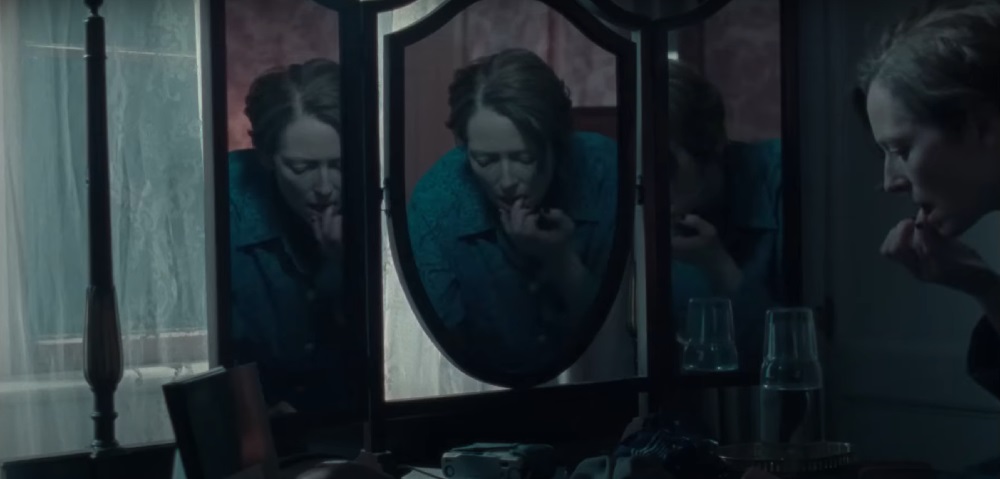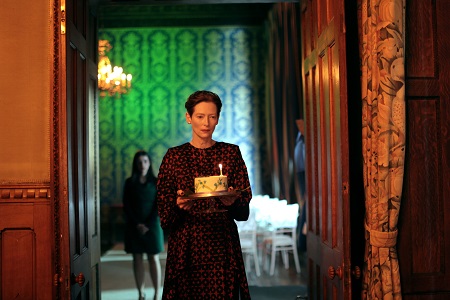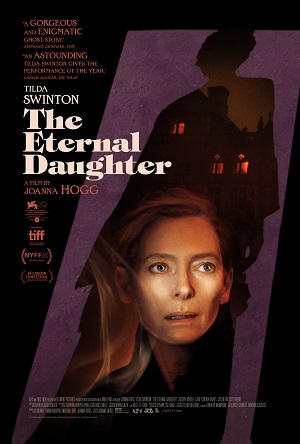
The Eternal Daughter (2022)
by Sara Michelle Fetters - December 29th, 2022 - Four-Star Corner Movie Reviews
Lovingly Intimate Daughter is a Hauntingly Poignant Stunner
Filmmaker Julie Hart and her mother Rosalind arrive at the eerily beautiful and strangely isolated Moel Famau late. The place is strangely empty yet, according to the curt receptionist (Carly-Sophia Davies), the room they reserved will not be available until the next day. The kitchen is closed. They will have to make do with whatever they have brought with them for tonight, and all remaining issues will be rectified in the morning.
Things are not as they appear. Everything is exactly as expected. Nothing goes to plan. Everything is perfect. This is just the beginning.
The Eternal Daughter might be 2022’s best film. An extraordinarily moving drama of celebration, regret, creation, loss, and family, this latest feature by writer-director Joanna Hogg (The Souvenir, The Souvenir: Part II) grabbed my heart in an icily intimate embrace and then refused to let go. For 96 minutes I was in awe, and the journey mother and daughter go on is one I will never forget.
Tilda Swinton portrays both Julie and Rosalind, and in a career overflowing with magnificent performances, this may be one of her best. She dives in confidently, creating two distinct characters with their own personalities, histories, and ghosts who all stalk them down the lonely hallways of Moel Famau. As much as mother and daughter have in common, the emotional baggage they carry remains their own, and Swinton brings all this into the piercing, unflinching light with perceptive gracefulness.
The gist is that Julie and Rosalind have come to this secluded Welsh locale so the former can work on her new screenplay, incorporating remembrances of the latter’s childhood. Before Moel Famau was a hotel, for a few years it was also Rosalind’s home when she was a little girl. Memories hide around every corner and lurk in all the shadows. Windows shoot back cascading images as if they were funhouse mirrors, and even something as simple as a walk around the estate’s gardens produces profound internal reactions that run the emotional gamut from joy to sorrow and back again with paralyzing speed.
Hogg and cinematographer Ed Rutherford (The Ones Below) structure and shoot things as if they were making a suspenseful horror picture: the camera glides down hallways, cascades of fog ominously drift through the frame, and shadows dance in splashes of light with ethereal guile. Editor Helle le Fevre (The Souvenir) allows scenes to play out with minimal intrusion, each cut an ingeniously subtle showcase of storytelling specificity that only augments the uncertain melancholic aura the director has so skillfully generated.
But there is nothing scary going on here. While Moel Famau is haunted, the only spirits stalking Julie and Rosalind are the ones they carry with them. These two women are searching for answers, but the exact questions elude them. Time loses meaning, and this moment of togetherness is all that seems to matter. Day and night blur into one, hard truths are revealed, and poignantly triumphant revelations are made.
What Julie is seeking isn’t important; it’s what she finds that matters. While more can be said, the glory of The Eternal Daughter is that individuals will likely find something of themselves lurking in the spectral confines of Moel Famau. Julie’s story is shaped by what the viewers bring to the table; they are as involved in the outcome as she is. This allows Hogg to create a gothic delight of self-discovery where every experience will be unique, and that’s exactly as it should be.
– Review reprinted courtesy of the SGN in Seattle
Film Rating: 4 (out of 4)







